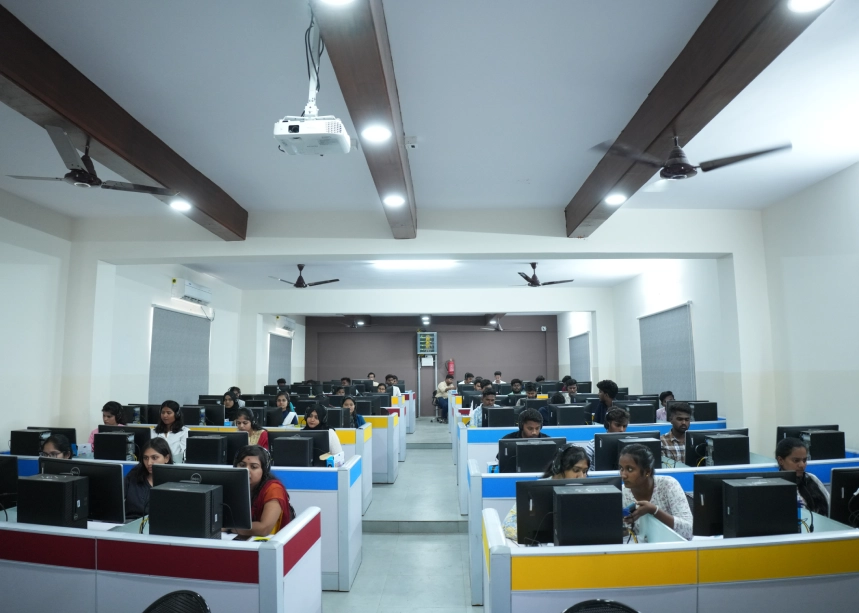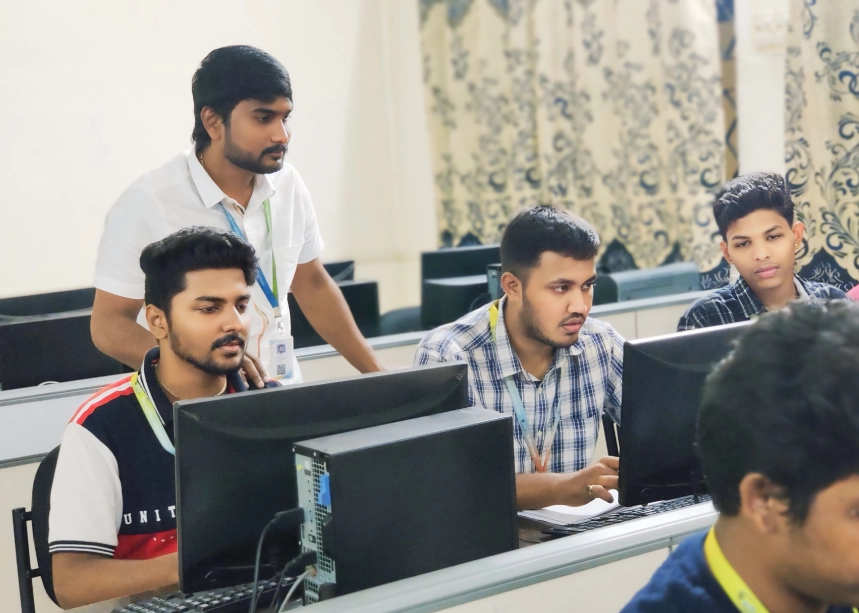Programme Level
Under Graduate
Duration
4 Years
About the Program
Program Overview
The Data Science Engineering branch is becoming increasingly crucial in today’s tech landscape. Data scientists need to excel in both coding and statistics to effectively analyze data across various fields. They apply their expertise in machine learning, statistics, and data visualization to make sense of complex datasets. With companies actively seeking skilled data professionals, the demand for data scientists has surged, positioning this role as a key entry point into the exciting domains of big data and machine learning.


The field of data science is an excellent career choice, providing high salaries, diverse opportunities across multiple industries, and strong job security. Data scientists are in high demand, enjoy significant earning potential, and possess skills that will continue to increase in value. Additionally, this field offers a broad range of job opportunities and allows data scientists to contribute positively to society.
The Computer Science and Engineering Department (Data Science) was started in 2021-22. Currently, the department accepts 120 new students each year. We have really good teachers from top colleges in India, and our facilities are top-notch. This creates a great environment for students to become skilled data engineers and scientists.
Eligibility Criteria
Students who have passed Karnataka 2nd PUC/ 12th Std, / 10+2 / Intermediate or equivalent exam with Physics & Mathematics along with Chemistry/ Computer Science / Biology and any other optional subject with English as one of the languages of study and should have obtained a minimum of 45% marks. For SC/ST & other backward classes of Karnataka students only, the minimum marks is 40% in aggregate in the optional subjects in the qualifying examination, irrespective of marks obtained in the Common Entrance Test / COMED-K/ AIEEE. (Eligibility as per the Govt. Norms from time to time.)
Career Options
A degree in Data Science & Engineering
Program Fees
Duration
4 Years
Program
CSE- (Data Science)
Type
- SNQ
- CET
- COMED-K
- MANAGEMENT
Amount
- Rs. 46,360/-
- Rs. 1,22,495/-
- Rs. 3,070,87/-
- Rs. 2,65,000/-
Admission Process
Students who have passed Karnataka 2nd PUC / 12th std / 10+2 / Intermediate or equivalent exam with Physics & Mathematics along with Chemistry / Computer Science / Biology and any other optional subject with English as one of the languages of study and should have obtained a minimum of 45% marks.


For SC/ST & Other backward classes of Karnataka students only, the minimum marks is 40% in aggregate in the optional subjects in the qualifying examination, irrespective of marks obtained in the Common Entrance Test / COMED-K / AIEEE / any other equivalent entrance examinations. (Eligibility as per the Govt. Norms from time to time).
Program Educational Objectives (PEOs)
PEO-1
Graduates will garner peer recognition, either individually or as part of a team, for their specialized knowledge and expertise in data analysis, statistical inference, data mining, and problem-solving within the global data analytics industry.
PEO-2
Graduates will demonstrate leadership qualities, capable of navigating diverse circumstances and environments, fostering multidisciplinary collaboration to address complex challenges effectively.
PEO-3
Graduates will exhibit a commitment to lifelong learning, embracing new skills and techniques to tackle emerging challenges posed by evolving technologies in the field of data science.
Program outcomes (POs)
PO 1
Engineering knowledge
Apply the knowledge of mathematics, science, engineering fundamentals, and an engineering specialization to the solution of complex engineering problems.
PO 2
Problem analysis
Identify, formulate, review research literature, and analyze complex engineering problems reaching substantiated conclusions using first principles of mathematics, natural sciences, and engineering sciences.
PO 3
Design/development of solutions
Design solutions for complex engineering problems and design system components or processes that meet the specified needs with appropriate consideration for the public health and safety, and the cultural, societal, and environmental considerations.
PO 4
Conduct investigations of complex problems
Use research-based knowledge and research methods including design of experiments, analysis and interpretation of data, and synthesis of the information to provide valid conclusions.
PO 5
Modern tool usage
Create, select, and apply appropriate techniques, resources, and modern engineering and IT tools including prediction and modeling to complex engineering activities with an understanding of the limitations.
PO 6
The engineer and society
Apply reasoning informed by the contextual knowledge to assess societal, health, safety, legal and cultural issues and the consequent responsibilities relevant to the professional engineering practice.
PO 7
Environment and sustainability
Understand the impact of the professional engineering solutions in societal and environmental contexts, and demonstrate the knowledge of, and need for sustainable development.
PO 8
Ethics
Apply ethical principles and commit to professional ethics and responsibilities and norms of the engineering practice.
PO 9
Individual and team work
Function effectively as an individual, and as a member or leader in diverse teams, and in multidisciplinary settings.
PO 10
Communication
Communicate effectively on complex engineering activities with the engineering community and with society at large, such as, being able to comprehend and write effective reports and design documentation, make effective presentations, and give and receive clear instructions.
PO 11
Project management and finance
Demonstrate knowledge and understanding of the engineering and management principles and apply these to one’s own work, as a member and leader in a team, to manage projects and in multidisciplinary environments.
PO 12
Life-long learning
Recognize the need for, and have the preparation and ability to engage in independent and life-long learning in the broadest context of technological change.
Program Specific Outcomes
PSO 1
Inculcate the principles of Data Science, Data Management, Data Security and Visualization for building intelligent predictive
PSO 2
Applying the knowledge of analytics, statistics and Machine Learning concepts to solve real world business problems
Program Curriculum 2022 Scheme
| Sl No | Course code | Course Name |
|---|---|---|
| 1 | 22MATS11 | Mathematics for CSE Stream-I |
| 2 | 22PHYS12 | Physics for CSE stream |
| 3 | 22POP13 | Principles of Programming Using C |
| 4 | 22ESC14x | Engineering Science Course-I |
| 5 | 22ETC15x | Emerging Technology Course-I |
Or |
||
| 22PLC15x | Programming Languages Course-I | |
| 6 | 22ENG16 | Communicative English |
| 7 | 22KSK17 22KBK17 | Samskrutika Kannada/ Balake Kannada |
Or |
||
| 20ICO17 | Indian Constitution | |
| 8 | 22IDT18 | Innovation and Design Thinking |
Or |
||
| 22SFH18 | Scientific Foundations of Health | |
| Sl No | Course code | Course Name |
|---|---|---|
| 1 | 22MATS21 | Mathematics for CSE Stream -II |
| 2 | 22PHYS22 | Physics for CSE Stream |
| 3 | 22POP23 | Principles of Programming Using C |
| 4 | 22ESC24x | Engineering Science Course-II |
| 5 | 22ETC25x | Programming Language Course-II |
Or |
||
| 22PLC25x | Emerging Technology Course-II | |
| 6 | 22PWS26 | Professional Writing Skills in English |
| 7 | 22KSK2722KBK27 | Samskrutika Kannada/ Balake Kannada |
Or |
||
| 20ICO27 | Indian Constitution | |
| 8 | 22IDT28 | Innovation and Design Thinking |
Or |
||
| 22SFH28 | Scientific Foundations of Health | |
| Sl No | Course code | Course Name | |
|---|---|---|---|
| 1 | 22MDA31 | Graph theory and Discrete Mathematical Structures, Probability and Statistics | |
| 2 | 22CD32 | Digital System Design and Computer Organization | |
| 3 | 22CD33 | Operating System | |
| 4 | 22CD34 | Data Structures and Applications | |
| 5 | 22CDL35 | Data Structures Lab | |
| 6 | 22CD36X | ESC/ETC/PLC Object Oriented Programming With JAVA |
|
| 7 | 22CD37 | Social Connect and Responsibility | |
| 8 | 22CD38X | Ability Enhancement Course / Skill Enhancement Course - III |
|
| 9 | 22NS39 | National Service Scheme (NSS) | |
| 10 | 22PE39 | Physical Education (PE) (Sports and Athletics) | |
| 11 | 22YO39 | Yoga | |
Ability Enhancement Course – III |
|||
| 22CD381 | Unix and Shell Programming | 22CD382 | Version Controller with GiT |
| 22CD383 | R Programming | ||
| Sl No | Course code | Course Name | |
|---|---|---|---|
| 1 | BSC | 22BB41 | Biology for Engineers |
| 2 | IPCC | 22CD42 | Introduction to Data Science |
| 3 | IPCC | 22CD43 | Database Management Systems |
| 4 | PCC | 22CD44 | Analysis and Design of Algorithms |
| 5 | PCCL | 22CDL45 | Algorithms Lab |
| 6 | ESC | 22CD46X | ESC/ETC/PLC |
| 7 | AEC/ SEC | 22SSA47 | Soft Skill & Aptitude |
| 8 | UHV | 22UH48 | Universal human values course |
| 9 | MC | 22NS49 | National Service Scheme (NSS) |
| 22PE49 | Physical Education (PE) (Sports and Athletics) | ||
| 22YO49 | Yoga | ||
Engineering Science Course (ESC/ETC/PLC) |
|||
| 22CD461 | System Software | 22CD462 | Object Oriented Programming with Python |
| 22CD463 | Introduction to Data Analytics | ||
| Sl No | Course and Course Code | Course Title | |
|---|---|---|---|
| 1 | HSMS | 22CD51 | Software Engineering & Project Management |
| 2 | IPCC | 22CD52 | Computer Networks |
| 3 | PCC | 22CD53 | Artificial Intelligence |
| 4 | PCCL | 22CDL54 | Artificial Intelligence Lab |
| 5 | PEC | 22CD55X | Professional Elective Course |
| 6 | PROJ | 22CDMN56 | Mini Project |
| 7 | AEC | 22ADA57 | Advanced Aptitude(Ability Enhancement Course / Skill Development Course) |
| 8 | MC | 22ES58 | Environmental Studies |
| 9 | MC | 22NS59 | National Service Scheme (NSS) |
| 22PE59 | Physical Education (PE) (Sports and Athletics) | ||
| 22YO59 | Yoga | ||
Professional Elective Courses |
|||
| 22CD551 | Automata Theory & Compiler Design | ||
| 22CD552 | Computer Graphics & Visualization | ||
| 22CD553 | NoSQL | ||
| 22CD554 | UI / UX | ||
| Sl No | Course and Course Code | Course Title | |
|---|---|---|---|
| 1 | IPCC | 22CD61 | Big Data Analytics |
| 2 | PCC | 22CD62 | Machine Learning |
| 3 | PEC | 22CD63X | Professional Elective Course |
| 4 | OEC | 22CD64X | Open Elective Course |
| 5 | PROJ | 22CDP65 | Project Work – Phase I |
| 6 | PCCL | 22CDL66 | Machine Learning Lab |
| 7 | AEC | 22RM67 | Research Methodology & IPR |
| 8 | MC | 22NS68 | National Service Scheme (NSS) |
| 22PE68 | Physical Education (PE) (Sports and Athletics) | ||
| 22YO68 | Yoga | ||
Professional Elective Courses |
Open Elective Courses |
||
| 22CD631 | DevOps | 22CD641 | Data Structures and Applications |
| 22CD632 | Natural Language Processing | 22CD642 | Data Base Management System |
| 22CD633 | Data Visualization | 22CD643 | Operating System |
| 22CD634 | Block Chain Technology | 22CD644 | UI / UX |
Faculty
Admission to Higher Semester:
- After the announcement of the reopening date of the college, the candidates have to register for the admission with an application enclosing all the photos copies of previous semesters marks card/s through their department HOD and they have to pay the applicable Tuition Fees / Registration Fees within a week of reopening the institute for class work.
- The students who fail to register within the first week of re-opening, the student will be charged a penalty
- The names of the students will be deleted, in case they fail to register as per the schedule
- Any financial matters are required to be referred to the principal only
- Once the student is admitted he/she will be under the guidance of the department and all the academic matters should be addressed through the Head of the department only.
- Students are expected to maintain discipline in the college campus & not to indulge in “Ragging Activities”.
FAQs
The main goal of the computer science Data Science degree is to provide the theoretical and practical background for someone to become a data engineer. Graduates of the program typically begin their careers working as part of a team that is responsible for some large, existing system, maintaining the code, and making extensions to it.
The data science program provides students with the knowledge and skills needed to become a data scientist. The typical job entry-level data scientist works as part of a team to build models from data that can be used to understand a phenomenon, and potentially take advantage of this understanding in various ways. You should choose your program based on which career you are most interested in pursuing—a software engineer or a data scientist
You might want to consider a double major if:
You are interested in computer science, but would like to go more in depth into areas such as working with massive data sets, statistical analysis of data, or machine learning You are interested in data science, and have a strong interest in the "under the hood" details such as systems aspects and writing/analyzing software You are unsure whether you want to start your career as a software engineer or a data scientist
However, please note that you will unless you take a lot more courses, you will have less knowledge/skills than someone majoring in just one or the other. Instead of a double major, another path to consider would be to obtain a B.S. in either computer science or data science, and then get an M.S. in the other.
A data science course is like a guide that teaches you how to handle and make sense of data. It's a set of lessons or classes that teach you the skills and tools needed to collect, analyze, and draw useful insights from different kinds of information.
Think of it as a roadmap that helps you understand how to use data to solve problems or make decisions. An ideal data science course should cover industry-required topics and be updated regularly. Hence, besides programming languages, it should equip the learner with the soft skills required by a data science aspirant.
Data science courses are designed for individuals with diverse educational backgrounds and career goals. Here are some groups of people who might benefit from taking a data science course:
- IT Professionals: Individuals in the information technology (IT) field who want to transition into data science or expand their skill set can benefit from data science courses. Programming skills and a strong understanding of algorithms are advantageous in this context.
- Business Professionals: Marketing, finance, and operations professionals can use data science to gain valuable insights and inform decision-making
- Career Changers: People looking to switch careers can be from commerce, arts or any education stream. They can enter data science by building on the foundational understanding of key concepts and skills.
- Undergraduates: Some data science courses are suitable for undergraduate students who want to complement their degree with data analysis, machine learning, and programming skills.
- Computer Science Graduates: Individuals with a background in computer science may take data science courses to specialize in areas like machine learning, artificial intelligence, or data engineering.
- Statisticians and Mathematicians: Those with a background in statistics or mathematics may find data science courses helpful in applying their skills to real-world problems, especially in areas like data analysis and machine learning.
Yes, the Data Science department collaborates with various tech companies to provide students with internships and project work, enhancing practical knowledge and job readiness.
Students will enhance their programming, analytical, problem-solving, project management, and communication skills throughout the program.
Yes, we encourage participation in clubs, hackathons, technical fests, and community service activities to foster teamwork and leadership skills.
Students typically work on real-world projects, including software applications, web development, and research projects.
Absolutely! We provide access to various online learning platforms and resources for additional coursework and skill development.
Students can stay informed through our official website and social media channels.
Yes, we regularly organize workshops, seminars, and certification courses to help students gain practical skills and stay updated with industry trends.

























